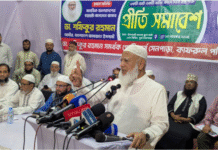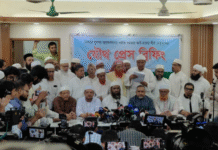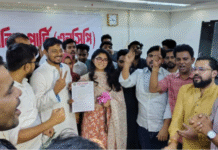By Rupak Bhattacharjee*
The Bangladesh Nationalist Party’s (BNP) claim on the eve of Indian Prime Minister Narendra Modi’s ground-breaking visit to Dhaka that it never indulged in anti-India politics surprised many observers in both the countries. This dramatic U-turn of the BNP needs to be analysed in the context of the party’s receding popularity, Bangladesh’s current political dynamics and the history of anti-India politics in the country and India-Bangladesh relations.
The major opposition BNP, which leads an 18-party alliance, is out of power for nearly a decade. Party supremo Begum Khaleda Zia is no longer a popular leader primarily due to her alleged involvement in widespread corruption and for facilitating religious extremism and terrorism while she was premier from 2001 to 2006.
The party in its bid to make a comeback to power, urged the Indian leadership to “restore democratic rule” in Bangladesh. The BNP does not recognise the present Awami League (AL) government that assumed office following the largely boycotted January 2014 parliamentary elections. The BNP leaders expected India to be sympathetic to their long-standing demand of holding midterm elections in Bangladesh.
After meeting Modi, the BNP leaders who had accompanied Khaleda, said the Indian prime minister emphasized that New Delhi seeks to build lasting relations with the people of Bangladesh, not with any particular party or government. Khaleda’s political associates clarified that calling for resolving the outstanding issues between the two countries, including water sharing of Teesta river and condemning killing of Bangladeshis in border areas, did not mean that BNP was anti-India. The BNP leaders said the party wants good neighbourly and “an effective relationship with India”.
It may be added that the BNP did not criticise the AL government for signing connectivity deals with India during Modi’s visit as it did earlier. After the Dhaka bilateral summit of September 6-7, 2011, the party opposed granting of transit facilities to India’s landlocked northeastern states through Bangladesh’s territory on security ground.
The change of government in New Delhi and the new leadership’s focus on productive engagement with India’s immediate neighbours raised hopes for beleaguered Khaleda. The party believes that the National Democratic Alliance (NDA) government’s plan for regional development has striking similarities with the concept of South Asian Association for Regional Cooperation developed by BNP founder Ziaur Rahman.
It appears that the BNP, which is known for India bashing, had apparently changed its tactics to build a rapport with Modi. Khaleda congratulated him even before the formal announcement of the 2014 Lok Sabha election results. She lauded the NDA government immediately after the Indian parliament unanimously ratified the Land Boundary Agreement. Khaleda was keen to meet Modi ever since he assumed office.
Despite Khaleda’s outreach, New Delhi remains concerned over her party’s hobnobbing with Pakistan’s Inter Services Intelligence and support to northeastern militants as they constitute serious threat to India’s peace and security. The Jamaat-e-Islami-BNP alliance government did patronise Indian separatists and the landmark verdict of the Chittagong Metropolitan Special Tribunal-1 on the April 2004 arms haul case exposed the nefarious designs of the top leaders of the two parties to destabilise India’s northeast.
The Indian prime minister during his meeting with Khaleda reportedly made it clear that New Delhi is opposed to fundamentalism and terrorism. According to the Bangladeshi media reports, Modi told Khaleda that some members of her cabinet were directly involved in arms smuggling to north east via Chittagong port. Modi also raised the issue of BNP’s alliance partner Jamaat’s involvement in the Burdwan blast case.
Reports say Khaleda assured Modi that BNP’s alliance with Jamaat is only an electoral one and that the ideologies of the two parties are different. During the meeting with Modi, the BNP delegation insisted that they believe in democracy and do not support religious fundamentalism and militancy. The party leaders said Khaleda had convinced Modi that she would refrain from doing anything against the interest of India.
But at the same time it cannot be denied that the BNP has always been an India-basher since it was floated by Ziaur Rahman in 1978. Zia’s military regime was desperately looking for a civilian support base and the Islamist political groups that violently resisted Bangladesh’s emergence as an independent nation in 1971, offered much needed support to it. The BNP, which he created with the active assistance of intelligence organisations, was filled with politicians ranging from religious fanatics to pro-Beijing communists. The union of divergent ideological persuasions under one platform was possible due to their common paranoid views about the AL, its secular-nationalist ideology and foreign policy priorities.
Today’s BNP draws its ideological moorings from those formative days. Badroddoza Choudhury, BNP’s founding general secretary, remarked that the opposition party under Khaleda has been pursuing “Jamaat-centric” politics. Many in Bangladesh believe that Khaleda is now driven by Jamaat’s radical ideology.
Recent reports suggest that the BNP has reverted to anti-India politics soon after Modi’s Dhaka visit. Former vice chancellor and an influential leader of BNP, Emajuddin Ahmed, commented that most of the agreements signed during the visit “upheld only India’s interest”. Khaleda and other BNP leaders had reportedly been engaged in misinformation campaigns against India to garner popular support. Khaleda has often dubbed the Sheikh Hasina government as a stooge of India in public gatherings.
Several Bangladeshi political analysts say BNP’s anti-India stance has been one of its “core political philosophies” right from the beginning. The anti-India politics began to rear its head after the violent political changeover of August 1975. The post-1975 Bangladesh polity was rolled back to the Pakistani framework in which neighbouring India was increasingly projected as the country’s number one enemy.
The 25-year India-Bangladesh Treaty of Friendship was termed as “treaty of slavery”. The BNP relentlessly campaigned against the treaty saying it was detrimental to Bangladesh’s interest. Facing persistent vilification campaigns against the treaty, the AL decided not to renew it after coming to power in 1996. The BNP continued its anti-India rhetoric and opposed the Ganges Water Treaty signed with India in 1996 and the Chittagong Hill Tracts Peace Accord inked with the indigenous tribal leaders.
Khaleda’s refusal to meet India’s President Pranab Mukherjee, who was on a state visit to Bangladesh in 2013, is another major display of her anti-India position. The Indian National Congress, which maintains historic ties with the AL, was in power then. The BNP accused the Congress-led government of providing “undue support” to the Hasina government.
When the NDA government assumed power, many BNP leaders became happy expecting a change in India’s approach towards the AL government. The BNP’S new found love for the NDA government has to be viewed against the backdrop of the democratic transition of power in India. The BNP perceives that Bangladesh has been deprived of it under Hasina.
India continues to be a key factor in Bangladesh’s domestic politics. It is unfortunate that an element of cynicism still persists in the India-Bangladesh discourse especially among the rightist and religion-based parties despite broadening and deepening of the bilateral ties in the last five years.
India developed a political consensus on its policy towards Bangladesh prior to Modi’s Dhaka visit while the opinion in Bangladesh was divided. The BNP welcomed the visit but remained skeptical about Bangladesh’s gain from it.
Perhaps, time has come for the BNP, a major contender of power in Bangladesh, to initiate introspection. After all, by keeping alive the bogey of perceived “Indian hegemony” is not helping the party’s cause. It is imperative that the party sheds its negative approach towards India as growing number of Bangladeshis have realised the benefits of forging closer ties with their most important neighbour.
*Dr. Rupak Bhattacharjee is an independent analyst based in Delhi. He can be reached at editor@spsindia.in
Source: Eurasiareview










Author of this article Dr. Rupak Mukherjee is well advised to visit Bangladesh and talk to the rank and file and then decide whether given India’s hegemonic impositions including installation and nurturing of a puppet and a repressive government in Dhaka there is much distinction between what is being termed, “BNP’s anti-Indian politics” and actual and justifiable mass resentment against India.